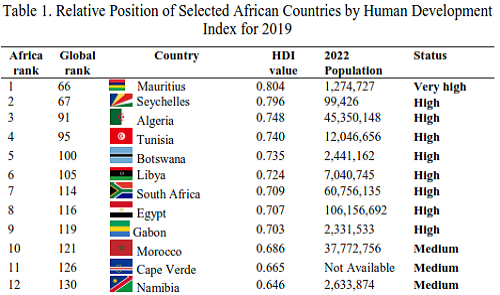
Making Waves for Nigerian Youths Through Education and Technology: The Harsh Fantasy of the Environment
Abstract
Keywords
Full Text:
PDFReferences
Abari, A. O. (2022). Stakeholders in Education: Who? A Lecture on Stakeholders In Education Delivered at Blazers school, Alimosho-Lagos, Nigeria, 24th of March, 2022.
Abari, A. O. (2019). Towards an Optimal Climate and a Dynamic Culture in Functional Educational Research for Sustainable National Development. Academic Journal of Research and Development, 11(1), 1 – 11.
Abari, A. O., Mohammed, M. O. B. & Gbenu, J. P. (2013). Eliminating Mass Poverty in Nigeria: Indices for Educational Planning and Administration: In A. O. Ayeni, U. G. Emetarom, A. Y. Abdulkareem, J. A. Undie, & J. E. Okon (eds). Managing education for national security. Nigerian Association for Educational Administration and Planning.
Ajay, S. (2020). Digital Education System and its Advantages. The Asian School “Asian Acres”, Vasat Vihar, Indira Negar, Dehradun
Akinyemi, I. A. & Mohammed, M.O.B. (2023). Achieving national Sustainable Development Through Educational Planning and Administration in Nigeria: The harsh reality. African Journal of Educational Management, Teaching and Entrepreneurship Studies, 9 (1), 60-75.
Akinyemi, I. A., Amaechi, L. I. & Etoh, L. C. (2022). Digitalisation of Education in Nigerian secondary schools: Benefits and challenges. Journal of Education & Humanities Research, 13(1), 34 – 44.
Akinyemi, K. O., Akinyemi, I. A. & Ajoseh, S. O. (2021). National Education Challenges in Nigeria: Postponing The Evil Days in The Educational Planner’s and Scientists’ lens. Journal of the Educated Teacher Studies, 2(1), 232-248.
Anaeto, F. C., Asiabaka, C. C., Ani, A. O., Nnadi, F. N., Ugwoke F. O., Asiabaka I. P., Anaeto, C. A. and Ihekeronye, N. (2016. The Roles of Science and Technology in National Development. Direct Research Journal of Social Science and Educational Studies, 3(3), 38-43.
Bejinaru, R. (2019). Impact of DIGITalization on Education in The Knowledge Economy. Management Dynamics in the Knowledge Economy, 7(3), 367-380.
Bijeesh, N.A. (2017). Advantages and Disadvantages of Distance Learning. Available online: /www.indiaeducation.net/onlineeducation/articles/advantages-anddisadvantages-of distancelearning.html (accessed on 7 May 2022).
Borisenkov, V., Gukalenko, O., & Pustovoitov, V. (2021). Digitalization of Education: Trends in Teacher Training. In E3S Web of Conferences (Vol. 273, p. 12075). EDP Sciences.
Brown, C. (2017). Advantages and Disadvantages of Distance Learning. Available online: https://www.eztalks.com/elearning/advantages-and-disadvantages-ofdistance-learning.html (accessed on 7 May 2022).
Daniel, J. (2020). Education and the COVID-19 Pandemic. Prospects, 49(1), 91-96.
Falasteen, N. (2018). The Implementation of Digitalization System in Education in Palestine. International Journal of Infonomics. 11; 1749-1754.
Federal Republic of Nigeria (2013). National Policy on Education 6th Edition. Lagos: NERDC Press.
Gillpatrick, T. (2020). Innovation and The Digital Transformation of Education. Sınırsız Eğitim ve Araştırma Dergisi, 5(3), 194-201.
Grant, C. (2017). The Contribution of Education to Economic Growth. K4D Helpdesk Report. Brighton, UK: Institute of Development Studies.
Human Development Report (2020) The Next Frontier: Human Development and the Anthropocene (PDF). hdr.undp.org. United Nations Development Programme. 15 December 2020. pp. 343–346. ISBN 978-9-211-26442-5. Archived (PDF) from the original on 15 December 2020.
Jain International Residential School (2021). Introduction to Digital Education and Its Benefits for Students. https://Digital Education and its Benefits for Students (jirs.ac.in)
Lawal, R. O., Akinyemi, I. A. & Gbenu, J. P. (2021). Quality Assurance Practices: Veritable Tools for Goal Achievement in Tertiary Educational Institutions in Nigeria. African Journal of Educational Management. 22(1), 235 – 253.
Macdallys, S. (2020). Technology and God’s Covenant. Journal of Research in Educational Management and Business Studies. 5(2), 225-237.
Martin, D. (2022). 21st century Inventions with The Biggest Impact. https://thebossmagazine.com/21st-century-inventions/
Mohammed, M.O.B, (2020), Managing Large Online Classes. A Virtual Lecture on: Learning Issue in Education and COVID-19 pandemic. Faculty of Education seminar, Lagos State University, 30th of June, 2020.
Nagrale, P. (2013). Advantages and Disadvantages of Distance Education. Accessed on 7 May 2022 from https://surejob.in/advantagesanddisadvantages-of-distance
Olaniyonu, S. O. A. & Gbenu, J. P. (2017). Educational planning and policy. Laideb ventures.
Ray, K. (2020). What is Remote Learning? https://www.techlearning.com/how-to/what-is-remote-learning
Reynolds, S. (2022). Cyberbullying Linked With Suicidal Thoughts and Attempts in Young Adolescents. https://www.nih.gov/news-events/nih-research-matters/cyberbullying-linked-suicidal-thoughts-attempts-young-adolescents
Siampani, A. (2021), The Benefits of Education For Every Individual – How It Helps People Prosper. https://ceoworld.biz/2021/03/27/the-benefits-of-education-for-every-individual-how-it-helps-people-prosper/
United Nations (2017) Sustainable Development Report Goals report. https://unstats.un.org/sdgs/files/report/2017/thesustainabledevelopmentgoalsreport2017.pdf.
University of the People (2022) Benefits of Education are Societal and Personal. https://www.uopeople.edu/blog/benefits-of-education-are-societal-and-personal.
Wikipedia (2022) List of African Countries by Human Development Index. https://en.m.wikipedia.org/wiki/list_of_African_countries_by_Human_Development_index
World Bank (2017) The Sustainable Development Goals Reality & prospects. https://pubdocs.worldbank.org/en/491561500316509118/FINAL-web-2030AgendaUpdate-20170713.pdf
World Bank (2019) World Bank Development Report; Building Human Capital. The Reason Why Government Should Get Involved, pp 49–52. http://documents.worldbank.org/curated/en/816281518818814423/pdf/2019-WDR-Report.pdf.
World Economic Forum (2016) Global Competitiveness Report 2015-2016 http://reports.weforum.org/global-competitiveness-report-2015-2016/education/#view/fn-53
World Population Review (2022). Most Developed Countries in Africa 2022. https://worldpopulationreview.com/country-rankings/most-developed-countries-in-africa
Zamani, E., Chashmi, M. and Hedayati, N. (2009). Effect of Addiction to Computer Games on Physical and Mental Health of Female and Male Students of Guidance School in City of Isfahan. Addict Health.; 1(2): 98–104.
DOI: http://dx.doi.org/10.31258/jes.7.3.p.382-399
Refbacks
- There are currently no refbacks.
Copyright (c) 2023 Isiaka Adeniran Akinyemi, Kabiru Olusegun Akinyemi

This work is licensed under a Creative Commons Attribution 4.0 International License.
Publisher: FKIP Universitas Riau













